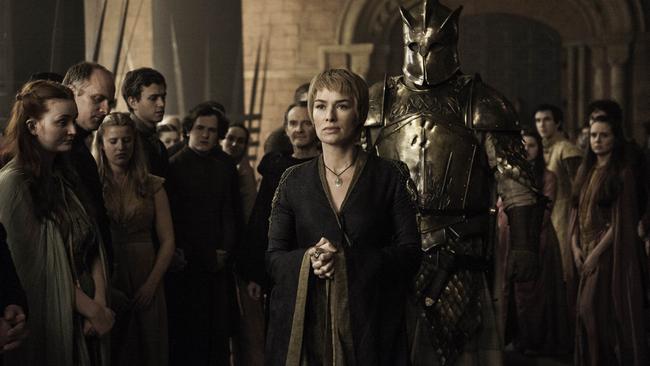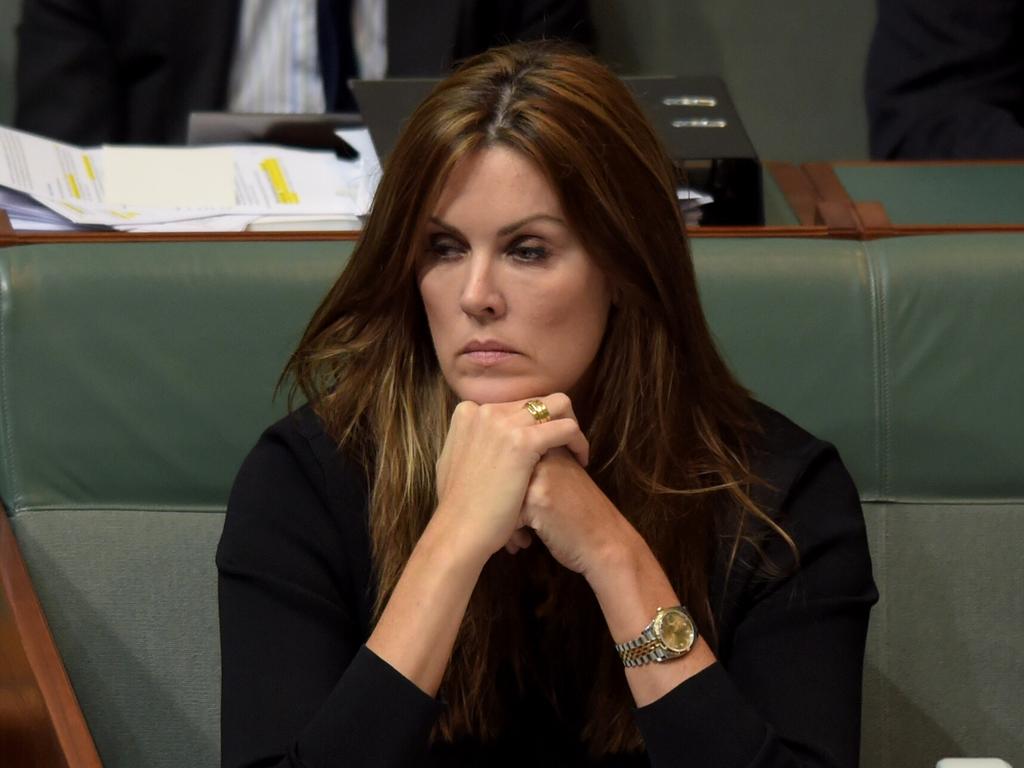Respect for women: Society will pay for loss of its Christian ideals
It’s easy enough to list what’s wrong. Trying to point the culture towards what’s right, what’s helpful, is much more difficult.

It seems at the least, therefore, unhistorical if not downright counterintuitive to think, as the commanding heights of culture have been telling us now for more than five decades, that we can transition into a neo-pagan culture and this will somehow be good for women, or for men either.
This past five weeks, from the shocking account of the alleged rape of Brittany Higgins and the overwhelmingly powerful National Press Club address of abuse survivor and Australian of the Year Grace Tame, have provided a wrenching examination of the national soul.
This has laid bare what most women have always known and many men long suspected, that women and girls do not get the respect they deserve, of and in and for themselves.
The problem with sexual assault lies with men. They are the perpetrators. But all of this — men and women — exist within a culture. And what’s happening to the culture affects what happens to the human beings within the culture.
The progressive orthodoxy, that we used to be overwhelmingly sexist and we’ve made great progress but we’ve still got a long way to go, is only about a quarter right. On some things we have made progress. On some things we’ve gone backwards.
My father, and countless men of his generation, did not treat women with disrespect. Nor did the culture mandate that he should. Our culture, right now, has the greatest trouble treating anybody with respect.
We are on the brink of becoming a majority atheist nation. The loss of religious belief in society affects the way we see human beings, men and women. It goes without saying that Christians frequently do not remotely live up to their ideals, but Christian ideals nonetheless have a lot to offer the culture in this moment of truth-telling and contradiction.
Elements of popular culture today work to degrade women, and men as well. This is beyond politics. The big mistake of the MeToo movement is not to become too sharply critical of men, but to turn their movement into a left versus right culture wars battleground. Abuse and disrespect transcend ideological lines.
The astonishing abusiveness of Twitter is dehumanising. While everybody who ventures into that sewer faces some foul level of abuse, it is far worse for women because so often the abuse is sexualised and violent in its imagery.
The ubiquity of ever more degrading pornography propounds implicitly the idea that women are primarily objects. Conservatives should welcome the MeToo movement in its late discovery of pornography’s damage. Like much of the rest of the Western world, I watched, compelled, as the brilliant Game of Thrones series unfolded across its many episodes. It was absolutely full of sexualised violence directed at women, and when its stars and producers were taxed with this, their characteristic response was to say there was plenty of violence against men as well, some of it carried out by women, as though in some bizarre fashion that evens the scales of cultural influence.
And Game of Thrones is a million miles away from the worst of it. John Dickson, the historian and popular Christian author, and presenter of Australia’s No 1 religious podcast, Undeceptions, offers this striking observation: “I’m convinced that in 50 years time, presuming we haven’t all gone back to barbarism, we will look back on this period of pornogriphication, of objectifying people and degrading them, as a justice issue, a human rights issue.”

It’s easy enough to list what’s wrong. Trying to point the culture towards what’s right, what’s helpful, is much more difficult.
Many years ago, Dickson wrote a book, A Sneaking Suspicion, about Christianity, in which in the first chapter he made a measured, gentle, friendly and wise argument for sexual fidelity within marriage and even a culture of purity. About six years ago, the culture had become so intolerant of this outlook that some anti-religion zealots managed to get it banned from NSW government schools for a month or so on the grounds it was “dangerous” (the ban was later overturned).
Dangerous? Maybe Christianity has some useful things to say about men and women and how they relate to each other. Rodney Stark, the foremost sociologist of religious history, argues in The Triumph of Christianity that it was Christianity’s pro-woman stance which more than anything led to its rapid expansion 2000 years ago.
Paul’s statement of universality in his letter to the Galatians was revolutionary: “There is neither Jew nor Greek, slave nor free, male and female. For you are all one in Christ Jesus.”
Larry Siedentop, the great Oxford scholar, in his history of liberalism, Inventing the Individual, judges Paul’s interpretation of Christian universalism as being directly responsible over the centuries for the evolution of liberalism. Destroying the religious distinction between men and women led eventually to destroying the civic distinction between them.
Given that the problem of sexual assault in particular, and domestic violence, of which there is a plague in Australia, is a problem with men, men could do much worse than look to Jesus as to how a man should behave towards women.
Throughout the Gospels, Jesus rebukes male power and patriarchy. In the Gospel of John there is one of the most affecting of all the scenes in the New Testament. A woman caught in adultery is brought before Jesus. The sexism inherent in the ancient world is evident in the fact that the man she was presumably caught with is not brought for punishment. Her accusers want Jesus to command death by stoning, which was the punishment in the law.
Instead, Jesus is mostly silent. He writes on the sand in the ground, and ancient tradition has it he is writing some of the crimes committed by the accusers. He then says: “Let he among you who has not sinned be the first to throw a stone.” The crowd, which had been menacing and unruly and full of that sense of violence a mob can possess, dissipates. I do not condemn you, Jesus tells the woman, go and sin no more.
If you’re not familiar with the Gospels, the best place to start is with Luke. His is the loveliest of the Gospels, because it has the most women in it, and has the most about women. Luke recounts a dinner Jesus attends at the home of a local big shot named Simon. A “notorious” woman shows up uninvited and Simon is furious. But Jesus rebukes him and defends the woman. She is welcome in my company. She is the recipient of Jesus’ love.
There are women, too, of great heroism and agency in the Gospels. Mary, the mother of Jesus, is one. She is an activist, an agent of history, she takes charge of her unexpected pregnancy. I have always liked the idea that she gave Luke all his great scoops about the incarnation of Jesus, which would show Mary already directing her story and directing history.
All the way through the Gospels the women are more faithful and more courageous than the men. The first human being to proclaim Jesus was a woman. At the cross, when Jesus was dying, there were three women, among them Mary, and only one man, John. And when Jesus rises from the dead, the first person to see him is Mary Magdalene, who tells the apostles. She is the apostle to the apostles. But with Easter soon approaching, let’s return to how Jesus treats women. As he is dying on the cross, over three hours in the most excruciating death we can imagine, as his body grows cold, as the birds find he is defenceless, as each breath is an agonising struggle to lift his shoulders and grasp some air, at that time, the last words he addresses to a human being are concern for Mary, his mother.
He tells his best friend John to look after Mary: “This is your mother.” Forget the theology of this, look just at the human love that is there.
Part of the Christian sexual revolution was to make marriage, for the first time, an institution of mutual love and respect, which was not the way it was conceived in the ancient world. Perhaps the central word in Christianity is respect, respect for human beings and human dignity. Christianity allowed its portrayal of human sexuality to become way too negative over the past 150 years. But its understanding that sex is really a big deal was a rejection of a central element of the barbarism of the pagan world.
Dr Emma Woods, in a fascinating piece on the ABC Religion and Ethics website, argued recently that just teaching the importance of consent, while obviously absolutely essential, is not enough to get respect back into relationships; there is a need to teach a morality of sexual ethics.
She contrasts the dominant cultural paradigm of today that sex is mainly recreational with the traditional human moral intuition that sex is a matter of great significance. Men’s brains are a little inferior because it’s easier for them to fall into the mistake of thinking it’s just recreation. Women are more hard-wired, according to Woods, to treat sex as something of great significance.
If it is something of no significance then it is naturally much harder for women and girls to say no — not legally or ethically harder, but psychologically. Yet this paradigm ultimately offends the innate nature of humanity.
One of the most important Christian elucidations of human sexuality is the Theology of the Body, which John Paul II, the greatest of the modern popes, produced. It is too little studied and promoted by Christians, even, weirdly, by Catholics. It is a profoundly rich meditation which cannot be easily summarised.
It starts with the inherent human dignity of each person, created in the likeness and image of God. It also sees the sexual relationship as an intrinsically divine element of human nature. Christians understand God as one being, but also, as the Holy Trinity, as a divine community of love. Both the Old Testament and the Gospels talks of marriage meaning that “the two shall become one flesh”. JP II sees this as a divine likeness in humanity to the community of love in the Trinity.
The Bible, Old Testament and New, is full of love, and the celebration of love, human as well as divine. Just read The Song of Solomon. But there is always the sense of the need for restraint, in order to respect oneself and to respect other people. The Christian churches need to preach their positive vision of human relationships much more clearly. And the secular culture, racing to the confused and disastrous entropy of its neo-paganism, would do well to listen.







The last time humanity tried living out a pagan culture it was pretty ugly. Relations between the sexes were terrible. The chief victims were women and children.